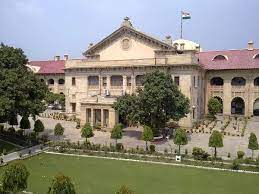The Allahabad High Court while allowing the petition held that presence of mens rea for evasion of tax is a sine qua non for imposition of penalty.
A typographical error in the e-way bill without any further material to substantiate the intention to evade tax should not and cannot lead to imposition of penalty.
A Single Bench of Justice Shekhar B Saraf passed this order while hearing a petition filed by M/S Hindustan Herbal Cosmetics.
This is an application under Article 226 of the Constitution of India wherein the petitioner assails the order passed by the Additional Commissioner Grade-2 (Appeal), Commercial Tax, Ghaziabad/ respondent No 3 dated August 29, 2019 and the order of the imposition of the penalty dated May 24, 2018 passed by the Assistant Commercial, Commercial Tax, Squad Unit-VI, Ghaziabad/ respondent No2.
The case of the petitioner is that the petitioner is a duly registered dealer under the Goods and Service Tax Act, 2017 and is a seller of cosmetics. The petitioner was supplying cosmetics to another registered dealer, namely, M/s Shree Sai Infotech in Jharkhand and the transaction was duly covered by a tax invoice, a bilty and e-way bill, all dated May 23, 2018.
It is a contention of the petitioner that the consignment of goods was sent by the petitioner in Vehicle. When the vehicle was in transit, the same was intercepted on 23.5.2018 10.40 P.M. by the Goods and Service Tax authorities. The seizure order was passed on the ground that the vehicle number in Part-B of the e-way bill was incorrect as the e-way bill showed the other vehicle number.
Apart from the above factual position, the Court noted that there was no other infraction on the part of the petitioner. Furthermore, the authorities have imposed a penalty only on the ground that the vehicle number was not mentioned correctly. There is no allegation of any attempt by the petitioner for evasion of tax as the e-way bill, bilty and the tax invoice were matching and the consignee was also a registered dealer.
Counsel on behalf of the petitioner has submitted that number 5332 was typed incorrectly as 3552. He has submitted that this is so obviously a typographical error and similar mistake has also been made in the impugned order that has been passed by the authority concerned.
Per contra, Ravi Shanker Pandey, Additional Chief Standing Counsel has submitted that the Department via a circular has allowed non imposition of penalty in cases where there are mistakes of two digits in the vehicle number and no further.
He has further submitted that the judgment in M/s Varun Beverages Limited (supra) would not apply as the same was a case of stock transfer and there was no question of any tax liability in that case.
He has also attempted to distinguish the Supreme Court judgment on the ground that it was a case wherein the e-way bill had expired just before the vehicle was detained and seized.
In the case, the court found that there is definitely an error with regard to typing of the vehicle number and there is a difference of three digits instead of the permitted two digits (as per the government circular) as submitted by the Additional Chief Standing Counsel. However, law is not to remain in a vacuum and has to be applied equitably in appropriate cases. The judgment in M/s Varun Beverages Limited (supra) may be referred to for this purpose.
“Upon perusal of the judgments, the principle that emerges is that presence of mens rea for evasion of tax is a sine qua non for imposition of penalty. A typographical error in the e-way bill without any further material to substantiate the intention to evade tax should not and cannot lead to imposition of penalty. In the case of M/s Varun Beverages Limited (supra) there was a typographical error in the e-way bill of 4 letters (HR – 73).
In this case, instead of ‘5332’, ‘3552’ was incorrectly entered into the e-way bill which clearly appears to be a typographical error. In certain cases where lapses by the dealers are major, it may be deemed that there is an intention to evade tax but not so in every case. Typically when the error is a minor error of the nature found in this particular case, I am of the view that imposition of penalty under Section 129 of the Act is without jurisdiction and illegal in law”, the Court observed while allowing the petition.
“In light of the above findings, the orders dated 29.8.2019 and 24.5.2018 are quashed and set-aside. The consequential reliefs to be provided to the petitioner within the next four weeks”, the Court ordered


